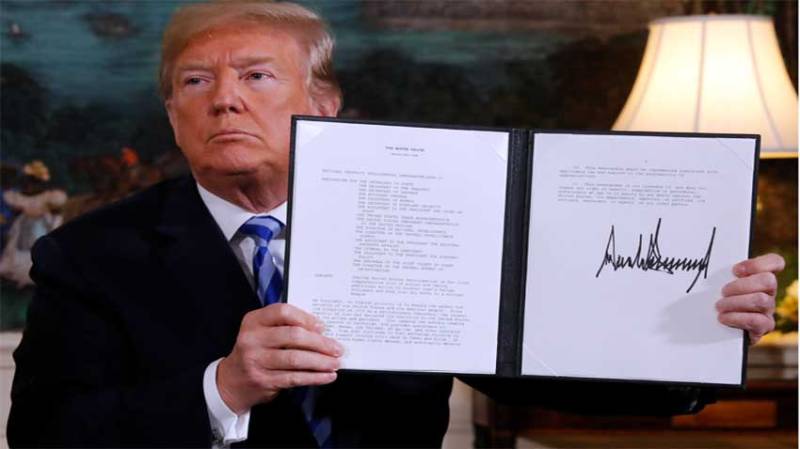US pulls out of int'l nuclear deal with Iran
Shares

WASHINGTON: President Donald Trump on Tuesday pulled the United States out of an international nuclear deal with Iran, raising the risk of conflict in the Middle East, upsetting European allies and casting uncertainty over global oil supplies.
Trump said in a televised address from the White House that he would reimpose U.S. economic sanctions on Iran to undermine “a horrible one-sided deal that should have never, ever been made.”
The 2015 agreement, worked out by the United States, five other world powers and Iran, lifted sanctions on Iran in exchange for Tehran limiting its nuclear program. The pact was designed to prevent Iran from obtaining a nuclear bomb.
But Trump complains that the accord, the signature foreign policy achievement of his Democratic predecessor, Barack Obama, does not address Iran’s ballistic missile program, its nuclear activities beyond 2025 or its role in conflicts in Yemen and Syria.
Trump’s decision intensifies the strain on the trans-Atlantic alliance since he took office 16 months ago, especially after European leaders made trips to Washington and repeatedly appealed to Trump to preserve the deal.
The Trump administration kept the door open to negotiating another deal with allies, but it is far from clear if the Europeans would go for that and if they could convince Iran to accept it.
A Western diplomat criticized Trump’s speech.
“It announces sanctions for which the first victims will be Trump’s European allies,” said the diplomat, adding that Trump’s decision would leave a lasting impression on European allies because it made clear that Trump does not care about the alliance.
The leaders of Britain, Germany and France, which were signatories to the deal along with China and Russia, said in a joint statement that Trump’s decision was a cause for “regret and concern.”
Underscoring the tension in the Middle East, the Israeli military went on high alert on Tuesday for a possible flare-up with neighboring Syria, which is allied to Iran.
Abandoning the Iran pact was one of the most consequential decisions of Trump’s high-stakes “America First” policy, which has led him to withdraw the United States from the Paris climate accord, come close to a trade war with China and pull out of an Asian-Pacific trade deal.
It also appeared to reflect the growing influence within the administration of Iran hawks like new Secretary of State Mike Pompeo and national security adviser John Bolton, both of whom have opposed the deal in the past. Defense Secretary Jim Mattis had favored sticking with the deal, although he later tempered his views.
(Reuters)
